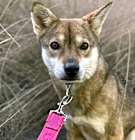Color
Brown/Chocolate - with Black
Size
(when grown) Small 25 lbs (11 kg) or less
Details
Not good with kids
Good with dogs
Not good with cats
House-trained
Spayed or Neutered
Shots are up-to-date
Story
Meet Sori🧡
Sori and her babies were rescued from Korean city shelter where parvovirus was spreading. When rescued, Sori was infected by heartworm and now fully recovered after all treatments at our center. All her puppies were adopted and met forever families. It's her turn to meet her forever family😀
* With People: Is unfamiliar with human touch and very shy at strangers. Is wary of even familiar people. Is so timid that she runs away when people approach.
* With Dogs: Is afraid of unknown big dogs. Feels comfortable with familiar friends but doesn't get along with them.
* Separation Anxiety: Stays alone very well!
* Potty Training: only outdoor potty
* Hygiene: Flinches and runs away when getting brushed because she is not used to the feeling of touch. When her nails are trimmed, she is scared and freezes, staying still.
* Walks: Accepts the leash well and walks in step!
* Car Sickness: Is nervous at first but gets accustomed as time goes by. Makes occasional mistakes in pottying.
* Is so much scared of and frightened with people and tends to bark at them.







